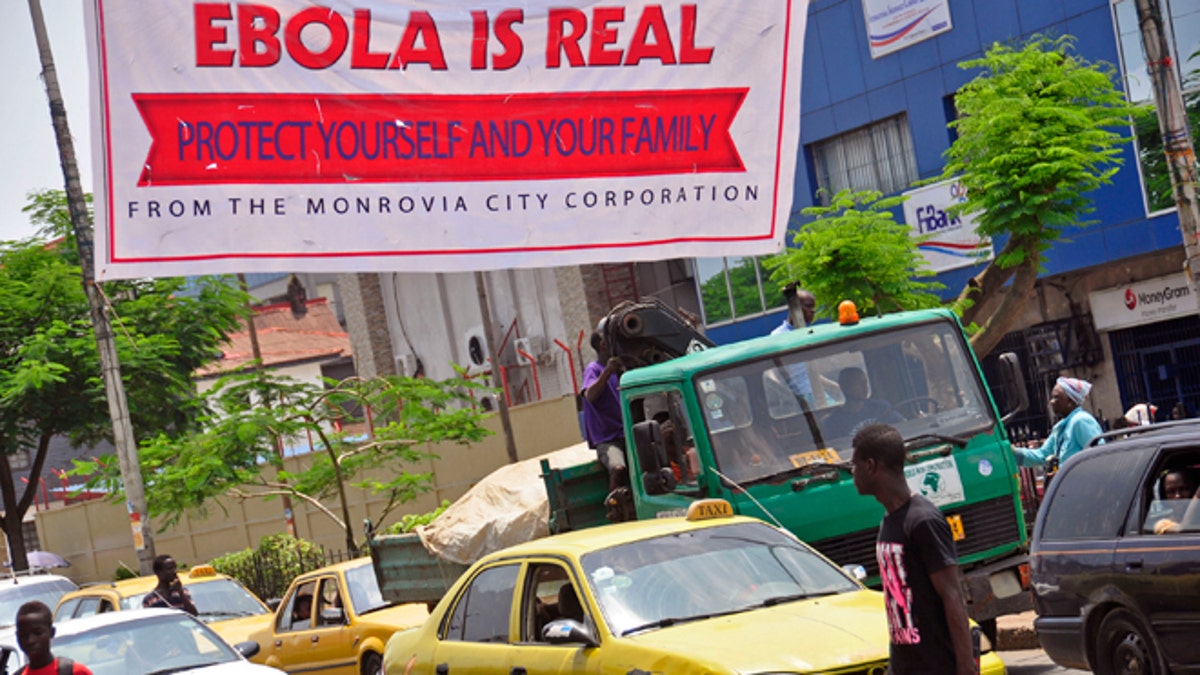
A banner reading: Ebola is real, Protect yourself and your family, warns people of the Ebola virus in Monrovia, Liberia, Saturday Aug. 2, 2014. (AP Photo/Abbas Dulleh)
The World Health Organization's (WHO) recent prediction that the Ebola epidemic in West Africa could afflict more than 20,000 people before it’s brought under control is sparking fear among some about what may happen if the virus goes airborne.
“The [estimate of 20,000] assumes full international backing for an intervention to control the deadly outbreak,” econometrics research assistant Francis Smart told WND.com.
“Failure to support the WHO’s plan presumably would cause the disease to spread in a similar manner as it already has,” Smart said.
The WHO projects six months will be the minimum amount of time needed to contain the epidemic.
However, Canadian researchers say the strain of Ebola afflicting West Africa can be transmitted between humans by breathing, opening up the possibility of the virus going airborne. Suspected cases of airborne infection have already been reported in monkeys in laboratories.
“The possibility of it becoming airborne could result in a global spread of the disease resulting in [an] unprecedented number of deaths world-wide -- it is more than prudent to heavily invest in controlling the number of new patients infected by this disease,” Smart told WND.com.
Smart’s predictions come on the heels of a warning from the director of the U.S. Centers for Disease Control and Prevention (CDC) who said the outbreak was “spiraling out of control.”
“Guinea did show that with action, they brought it partially under control. But unfortunately it is back on the increase now,” CDC's Dr. Thomas Kenyon said. “It’s not under control anymore,” adding the window of opportunity for controlling it was closing.
Kenyon also warned that the longer the outbreak went uncontained, the greater the possibility the virus could mutate.
Ebola has killed about 2,300 people with no sign of slowing six months after the outbreak began.
The disease is taking a particularly heavy toll on health care workers, whose jobs put them at high risk because Ebola is only transmitted through contact with the bodily fluids of people showing symptoms or dead bodies. More than 135 health workers have died in the outbreak so far, exacerbating shortages of doctors and nurses in countries that already had too few medical workers to begin with.
Sierra Leone and Liberia have been especially hard hit, and officials have warned that both countries could see a surge in cases soon. Sierra Leone is expecting to uncover potentially hundreds of new cases when volunteers go house to house looking for the sick during a three-day lockdown later this month. The WHO has said Liberia could see many thousands of new cases in the coming weeks.
"We are at war with an enemy that we don't see," Liberian Finance Minister Amara Konneh told reporters. "And we have to win the war."
But he said Liberia would be dependent on international assistance to do so. The U.N. has said at least $600 million is needed to fight Ebola in West Africa, and already several pledges have come in. The United States has spent $100 million so far, with more promised, and Britain has given $40 million.
Click here for more from WND.com
The Associated Press and Reuters contributed to this report.
